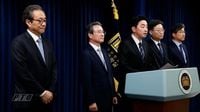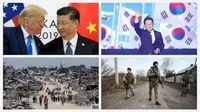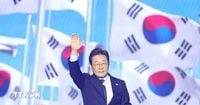South Korea ushered in a new era on June 4, 2025, as President Lee Jae-myung officially took office following a snap election victory confirmed by the National Election Commission (NEC) just a day earlier. His inauguration at the National Assembly marked the beginning of a five-year term characterized by significant domestic and international challenges, as well as ambitious promises to unite a politically fractured nation and steer the country through economic turbulence.
In his inaugural speech, President Lee pledged to bridge deep political divides and confront the nation's crises by fostering unity across all social strata. “I will strive to be a president of the people, serving the people,” Lee declared, signaling a commitment to inclusive governance amid a backdrop of intense political polarization. Notably, the entire cabinet of former President Yoon Suk Yeol had resigned en masse, underscoring the severity of partisan tensions. This political impasse forced Lee to make urgent decisions to prevent governmental paralysis reminiscent of the 2017 transition period when Moon Jae-in succeeded Park Geun-hye.
Economically, South Korea faces a daunting landscape. The country is grappling with negative real GDP growth, a decline in exports exacerbated by U.S. tariff policies, and staggering national debt approaching 2.5 times its GDP. To fulfill President Lee’s campaign commitments, an estimated $157 billion USD will be required, raising concerns about pushing public debt to unprecedented levels. Compounding these challenges, on June 5, the United States designated South Korea as a currency manipulator, adding strain to already tense economic relations.
Amidst these challenges, Lee swiftly assembled a government team with a focus on expertise and continuity. He nominated Kim Min-seok, a senior Democratic Party (DP) figure, as Prime Minister and appointed Kang Hoon-sik as Chief of Staff. Veteran diplomat Wi Sung-lac was named National Security Adviser, and former Unification Minister Lee Jong-seok took the helm of the National Intelligence Service. These appointments reflect Lee’s intent to blend seasoned experience with his vision for pragmatic governance.
On the foreign policy front, Lee reaffirmed South Korea’s steadfast alliance with the United States, emphasizing it as the “foundation” of his administration’s pragmatic approach. This was underscored during his first phone call with U.S. President Donald Trump on June 6, where both leaders agreed to accelerate ongoing tariff negotiations. The call also set the stage for a potential face-to-face meeting at the upcoming G7 Summit in Canada or the NATO Summit in The Hague later that month. Lee's commitment to strengthening trilateral cooperation among South Korea, the U.S., and Japan reflects a strategic effort to maintain regional stability amid shifting geopolitical dynamics.
Yet, balancing this alliance with the imperative to stabilize relations with China presents a complex diplomatic puzzle. Former U.S. Ambassador to South Korea Philip Goldberg described Lee’s foreign policy as a “complex balancing act,” highlighting the challenge of restoring ties with Beijing without jeopardizing the crucial U.S. partnership. Goldberg noted that while Washington urges its Asian allies to prioritize challenges posed by China, Seoul under Lee is placing greater emphasis on North Korea, signaling nuanced differences in strategic focus.
President Lee’s approach to China aims to “stabilize” relations, acknowledging Beijing’s significant regional influence. However, the intricacies of navigating this relationship without alienating Washington require deft diplomacy. Goldberg likened Lee’s position to “walking on a tightrope,” demanding flexibility and skill to manage competing interests. Adding to the complexity, issues such as the possible redeployment of U.S. troops in South Korea and burden-sharing discussions over the 28,500 American soldiers stationed there loom large on the bilateral agenda.
Domestically, Lee’s leadership is shadowed by ongoing legal challenges. He is under investigation for alleged violations of the Public Official Election Law and faces five other charges related to urban development irregularities during his tenure as governor of Gyeonggi Province. A retrial concerning election law violations is scheduled for June 18, 2025, with observers noting a high likelihood that Lee will have to appear in court and potentially face conviction. This legal uncertainty adds pressure on the new administration, raising questions about how it might affect governance and political stability.
Lee’s personal journey—from a factory worker in his youth to a human rights lawyer, then mayor and provincial governor—has shaped his progressive outlook. Surviving an assassination attempt in January 2024, when he was stabbed in the neck at a public event, Lee’s resilience has become emblematic of his political career. His trajectory informs his commitment to social justice and economic reform, yet the road ahead is fraught with obstacles.
In economic diplomacy, Lee’s administration is navigating tariff disputes and trade negotiations with the U.S. and the European Union. Discussions include potential tariff reductions on fertilizers and hormone-free beef imports from the U.S., alongside efforts to maintain strict EU food safety standards. These negotiations are critical as South Korea seeks to revitalize its export sector and manage its ballooning debt.
Looking ahead, Lee’s attendance at the G7 Summit in Canada represents a significant opportunity to assert South Korea’s role on the global stage. Analysts anticipate that he may engage in bilateral talks with President Trump and Japanese Prime Minister Shigeru Ishiba, potentially shaping the regional security architecture. However, the volatile geopolitical environment, marked by intensifying U.S.-China rivalry and deepening Russia-North Korea ties, will test Lee’s diplomatic acumen.
Experts like Professor Park Won-gon of Ewha Womans University emphasize the vagueness of Lee’s “pragmatic” foreign policy, urging the president to articulate clear guiding principles swiftly. The international community, particularly Washington, will be watching closely to gauge South Korea’s strategic direction amid these complexities.
In sum, President Lee Jae-myung’s administration steps into office amid a confluence of economic hardship, political fragmentation, legal scrutiny, and a challenging international landscape. Whether his government can navigate these headwinds with the promised unity and pragmatism remains an open question, but the stakes for South Korea—and the broader region—could not be higher.



